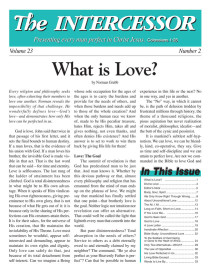
About Unconditional Love
There seems to be a real misunderstanding among Christians about the relationship between forgiveness and repentance because they are often con-fused about what God’s unconditional love really is. This is not just a theological issue since most of us are daily faced with repenting of our sins and forgiving others who have sinned against us, as Jesus said in the Lord’s Prayer. On the one hand, can we expect God and others to forgive us when we have not turned from our sin? On the other hand, can we forgive someone who won’t admit the wrong he’s done to us?
I believe this confusion is rooted in a failure to understand the true nature of God’s love. First, people seem to think that "unconditional" means absolute tolerance for any kind of behavior, no matter how mean or evil it is and no matter what the consequences to others. In my mind this is mere indulgence, not love. For how is it love to let a person go on destroying himself and others when setting a limit might turn him around? It is true that God loves us without conditions, but that does not mean that He tolerates sinful behavior.
God’s unconditional love means that He never stops desiring us to stop our sinful behavior and never stops acting to motivate us to stop. His love does not tolerate anything less than the best for us; no matter how far we wander from God, His love is always there for us, drawing us to Himself if we will only be honest with Him about what we have done. In this sense God’s love is unconditional. God does not give up on us.
Unconditional love does not mean, however, that God accepts our behavior no matter what we do. God’s love is unconditional, but it is neither tolerant nor indulgent. God’s love is a consuming fire that burns and destroys any-thing that will keep us from being pure vessels for Him to dwell in. Accepting us as we are does not translate into accepting "our behavior" as it is. God accepts us where we are in order to change where we are, or rather to change which spirit operates us and lives our lives.
For this reason, God cannot forgive without the person sincerely repenting of his sins. It is not that God does not desire to forgive: He wants to with His whole being. His whole drive is to restore sinning people to Himself and to deliver them from Satan’s misuse of them. But He cannot, as long as a per-son fails to come clean. If God forgave without requiring repentance, it would not be love–for the person would remain in Satan’s grasp.
God does not just wish to deliver us from guilt, a consequence of indwelling sin, but from the indwelling sin-producer himself. Only repentance–a total rejection of the sin–can break Satan’s hold over the person (see 2 Tim. 2:25-26).
Therefore, God’s love demands repentance. It is not a burdensome requirement, for divine love can settle for nothing less than a total restoration of the person to God. To desire any-thing less is Satanic. "God is not willing that any should perish, but for everyone to come to repentance" (2 Pet. 3:9). So if a person does not repent of his sin when confronted, he cannot be forgiven by God or by other Christians–not out of meanness or revenge, but out of God’s love.
So the idea that we must tolerate sinful behavior in people, no matter what the effect on self or others, is certainly not love. In fact, such tolerance is the supreme form of hatred, since it complacently allows the person to remain being operated by Satan and to continue getting the horrible consequences of such a choice. It is not love; it is granting our approval to such wickedness (Rom. 1:32).
We must not encourage someone to presume on the goodness of God as if anything he does will be automatically forgiven without the internal change of mind that is called repentance. It is not that we do not want to forgive, but that forgiveness would produce the opposite effect of what we desire, the restoration of the whole person. It would only confirm to the person that his behavior is really not all that bad, and as a result he would continue in it and continue to be operated by Satan.
God’s fiery passion within us, His love, compels us to take a hard line on sin because God’s desire is for every sinner to be fully restored to Himself. Restoration cannot happen without repentance.
More Articles from The Intercessor, Vol 23 No 2
- The Law of Opposites
- What is Love?
- Editor’s Note
- Body, Soul, Spirit
- We Only Know Right Through Wrong
- About Unconditional Love
- The All in All
- Long on Faith, Short on Love
- If You Love Me…
- God is Seen God
- A Love Letter, by C.T. Studd
- Inordinate Affection
- Bible Study: Unconditional Love
- To the Soldiers of God Goding or Gone to the Heart of Africa
- Only Two Alternatives–Which?
- As He is, so are we…
- Words to Live By





